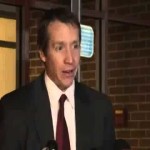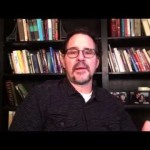We run our website the way we wished the whole internet worked: we provide high quality original content with no ads. We are funded solely by your direct support. Please consider supporting this project.

When God Needs an Intercessor
In the previous two posts, we have been exploring biblical narratives that point to how God’s knowledge is temporally conditioned and thus supports an open view of the future, or open theism as it is commonly called. The first addressed how God regrets and the second how God discovers. In this post, I want to briefly look at another example that demonstrates that God’s knowledge is temporally conditioned: the story of God searching for an intercessor.
The passage I want to explore is found in Ezekiel 22. Here the Lord declares his disappointment and righteous indignation with Israel. In a passage that emphasizes the urgency of prayer perhaps more emphatically than any other text in the Bible, the Lord says of his people:
The people … have oppressed the poor and needy, and have extorted from the alien without redress. And I sought for anyone among them who would repair the wall and stand in the breach before me on behalf of the land, so that I would not destroy it; but I found no one. Therefore I have poured out my indignation upon them (vv. 29-31).
If we take this passage at face value, the fate of Israel depends upon whether or not the Lord finds anyone to “stand in the breach” before him as Moses had done earlier in Exodus 32. Unfortunately, this time there was no one like Moses to intercede and alter God’s declared intent.
There are many examples of intercessors offering prayers to the Lord and God responding to them in such a way that he “changed his mind” in the light of human input and changing circumstances.
Examples include:
- Moses prayed and the fire of God’s punishment died down (Num 11:1)
- After God told Moses that he would raise up a nation around Moses, Moses interceded for the Israelites and God relented (Num 14:11ff)
- Moses and Aaron interceded for the assembly (Num 16:20-48)
- Moses prayed after the golden calf incident (Deut 9:13-26)
- David prayed on behalf of the land that was being destroyed by an angel (2 Sam 24:17-25)
- King Ahab repents and humbles himself and God delays the judgment (1 Kings 21:27-29)
- The leaders of Israel repent and God changes his judgment (2 Chron 12:5-8)
- The Lord relented after Amos prayed (Amos 7:1-6)
The genuineness of the Lord’s search for a person to stand in the breach is compromised if in fact God knew all along that no one would be found. Unless the Lord genuinely hoped he could raise up someone, genuinely tried to find that person and was genuinely frustrated at finding no one, it’s not clear what this passage communicates.
If God’s hope, attempt and frustration were genuine, the question of whether someone would stand in the breach had to be an open issue when God began his search. One can’t hope and try to find something one is certain does not exist. The open view renders the urgency that Scripture attaches to intercessory prayer intelligible precisely because it accepts at face value Scripture’s teaching that things genuinely hang in the balance on whether or not people pray.
—Adapted from Satan and the Problem of Evil, pages 107-108
Photo credit: rachel sian via VisualHunt / CC BY-NC
Category: General
Tags: Divine Foreknowledge, Free Will, Intercession, Prayer
Topics: Open Theism
Verse: Ezekiel 22
Related Reading

Grieving with the God who Pulled the Trigger?
Lawrence Krauss recently wrote a thought-provoking, soul-searching essay for CNN Opinion entitled, “Why must a nation grieve with God?” Krauss was disturbed by a comment made by President Obama at a memorial service for the victims of the tragedy at Newtown CT. Commenting on Jesus’ statement to “Let the little children come to me,” Obama opined:…

Is Free Will compatible with Predestination?
Question: Isn’t “freedom” simply our ability to do what we want? And if this is so there seems to be no incompatibility between saying that a person is “free” on the one hand, but predestined (or at least foreknown) by God, on the other. But why do you say that freedom is not compatible with…

5 Ways the Bible Supports Open Theism
Open Theism refers to the belief that God created a world in which possibilities are real. It contrasts with Classical Theism which holds that all the facts of world history are eternally settled, either by God willing them so (as in Calvinism) or simply in God’s knowledge (as in Arminianism). Open Theists believe God created humans and…

Hearing and Responding to God: Part 1
A reader contacted Greg asking about making “right decisions” assuming an open future and in light of the fact that God seems to rarely speak clearly. In this first response, Greg acknowledges that even with the best of intentions, our decisions can have outcomes that are unexpected even to God! How can we move forward…

Podcast: Was THIS World the Most Likely World and Wouldn’t God Have Anticipated It?
Greg considers what God might have risked and might have expected for this world. http://traffic.libsyn.com/askgregboyd/Episode_0224.mp3

Do Angels and Demons Really Exist?
While the supremacy of God is never qualified in the Bible, this supremacy is not strictly autocratic. Other “gods” or spiritual entities like angels and demons are not mere puppets of the God of the Bible. Rather, they appear to be personal beings who not only take orders but also are invited to give input…
